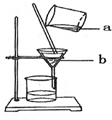百育二中化学兴趣活动小组的同学用洁净的塑料瓶从右江河中取回一定量的水样,然后进行如下研究分析:
(1)将浑浊的河水样品倒入烧杯中,加入明矾粉末搅拌(你一定知道加入明矾的作用:______),溶解后静置一会儿.
(2)将静置后的河水采用下图所示装置进行过滤,写出图中a、b两种仪器的名称:a______;b______.
(3)过滤后得到的水澄清透明,取少量于烧杯中,加入肥皂水并搅拌,发现烧杯中有大量浮渣,则说明右江水是______(填“硬水”或“软水”).日常生活中如果使用硬水会带来许多麻烦,家庭生活中常用来降低水的硬度的方法是______.

(1)明矾溶于水形成的胶体具有吸附性,能将不溶性固体小颗粒吸附在其表面,从而加快沉降的速率故填:吸附沉降;
(2)据图可知,a是烧杯,b是漏斗,故填:烧杯,漏斗;
(3)硬水中含有的可溶性钙镁化合物能与肥皂水结合产生浮渣,可溶性钙镁化合物受热易转化成不溶性钙镁化合物,故可以使用加热的方法降低水的硬度,故填:硬水,加热煮沸.
